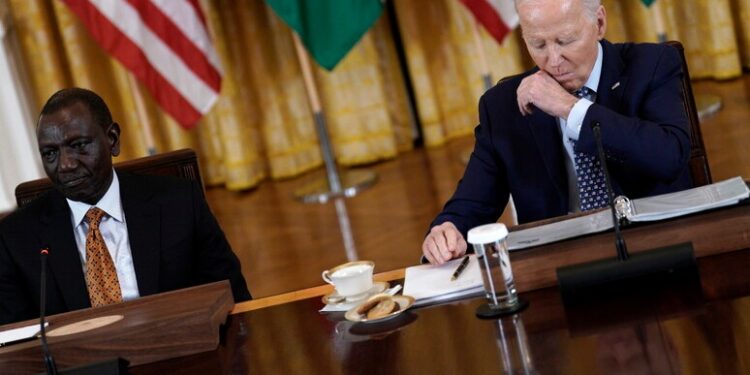In a significant diplomatic engagement, President Joe Biden welcomed Kenyan President William Ruto to the White House to discuss the pressing geopolitical issues in Africa and the forthcoming deployment of a Multinational Security Support Force in Haiti. The Kenya-led mission aims to bolster local police efforts against the rampant armed gangs destabilizing the Caribbean nation.
During the meeting, Ruto and Biden examined the logistics and strategic objectives of the mission. The initiative comes as Haiti grapples with severe security challenges, and Kenya’s decision to lead this effort has been met with both international praise and keen interest.
At the conclusion of the talks, Jake Sullivan, the U.S. National Security Advisor, commended Kenya’s commitment. He highlighted that Kenya has agreed to spearhead the mission by contributing approximately 1,000 police officers. These Kenyan forces will join additional contingents from the Bahamas, Barbados, Benin, Chad, and Bangladesh, ultimately creating a force that could number up to 2,500 personnel.
Sullivan described Ruto’s decision as “an unprecedented undertaking” and “a significant demonstration of global leadership by Kenya.” He emphasized that the operation reflects Kenya’s growing role on the international stage and its dedication to contributing to global peace and security.
In his remarks, President Ruto stressed the humanitarian motivation behind Kenya’s involvement. “We have not taken this initiative for the United States or any other country,” Ruto stated. “We intervene for humanity and because the people of Haiti are part of the African diaspora. We believe that Haitian children need help, and it is our duty to support them.”
Ruto’s statement underscores a deeper connection between Kenya and Haiti, rooted in shared heritage and a common desire to address humanitarian crises. His words reflect a commitment to global solidarity, particularly within the African diaspora, and a recognition of the interconnectedness of global communities.
Despite the positive momentum, the mission’s immediate deployment faces logistical delays. The Miami Herald reported, citing an unnamed U.S. official, that the first contingent of the Multinational Security Support Force might not be deployed this week as initially anticipated. However, there is optimism that the force could arrive by early June.
The delay highlights the complexities and challenges inherent in organizing and deploying a multinational force to a volatile region. Nonetheless, the international community remains hopeful that the presence of the force will bring much-needed stability and support to Haiti.
The collaboration between the U.S. and Kenya on this mission marks a significant moment in international relations. It exemplifies how nations can come together to address global security issues and support vulnerable populations. The meeting between Biden and Ruto not only solidified the strategic partnership between their countries but also set a precedent for future multinational humanitarian interventions.
As the situation in Haiti continues to evolve, the world watches closely, hoping that this collaborative effort will lead to tangible improvements on the ground. The Kenyan-led initiative, supported by diverse international contributions, represents a beacon of hope for Haiti and a model for future global cooperation in times of crisis.
The Biden-Ruto meeting thus stands as a testament to the power of international solidarity and the critical role of leadership in addressing some of the world’s most pressing challenges.














































